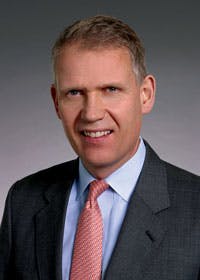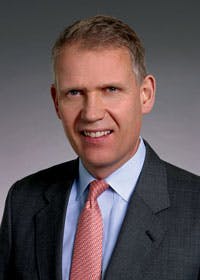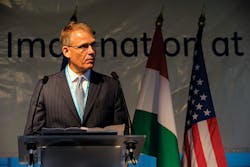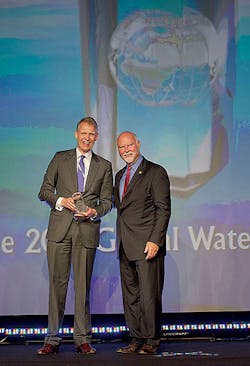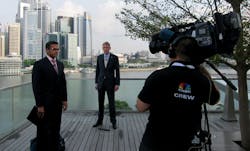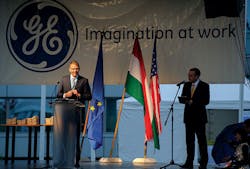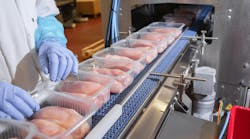Ever since GE brought its power and water divisions together four years ago, the company has made the most of its access potential to industrial water treatment clients. WWi catches up with Heiner Markhoff, president and CEO - water and process technologies for GE Power & Water, to discuss company developments.
WWi: Does GE still see itself as a technology supplier, rather than EPC (engineering, procurement & construction) contractor?
Heiner Markhoff, president and CEO—water and process technologies for GE Power & Water (HM): We see our primary role as a provider of differentiated products and technologies to help our customers meet increasingly difficult water challenges. Clear focus areas are more robust equipment and chemical products to enable simpler, more effective systems to treat challenging waters, and technologies to enable higher water recovery and recycle.
WWi: Water and power came together in the group in 2008 with the formation of GE Power & Water. How is this affecting growth today?
HM: We operate as a separate business within GE Power & Water, but we leverage our position in the power industry. Also, whenever it comes to projects on the power side when there's water involved we are at the table early on as a provider of water treatment technologies. Those are the markets synergies that we're leveraging. At the same time there are some backroom functions.
WWi: The industrial water sector has traditionally been a big part of GE Water's business. Is this changing and if so, how and into what areas?
HM: The industrial water business continues to be a big focus area for us. Water scarcity, regulation and new technologies are driving significant growth in the segment. We focus on many segments including unconventional fuels, refining, oil and gas, mining, food and beverage, semiconductor etc. Our specialty is tough to treat applications like steam assisted gravity drainage [SAGD] in the oil sands. We have done a few large projects in coal seam gas in Australia, enhanced oil recovery for existing oil fields globally, wastewater in refineries and other tough applications.
On the other side, we do ultra-pure water for semiconductor as well as ingredient water for food and beverage applications. In addition we can also treat heavy metals like mercury, selenium etc. through a variety of technologies. This business has proliferated globally and we see double digit growth here. We have a strong portfolio of offerings including chemicals, equipment and services. We have world class membranes and filtration products [UF, RO, filters, e-separation], thermal solutions [evaporators and crystallizers], mobile trailers, we can also do BOO's [Build-own-operate], in addition we have analytical instruments which can detect impurities in water.
WWi: We've heard from service providers that industrial water has become a pivotal market for them. How is this market changing?
HM: This sector is growing, nicely. We are well positioned in this market, especially when it comes to water reuse solutions in areas that are technically challenging – such as water in oil sands. Growth areas include China, India, Australia and other areas where water is scarce. Regulation, scarcity, and the ability to treat waters are driving this growth. Globally, we have strong growth in many areas - Australia is growing their gas production through coal seam gas – we can treat the produced water to reusable standards thereby meeting regulations and providing water to a water scarce region.
Fast facts: Heiner Markhoff Bio- Markhoff graduated from the University of Cologne, Germany, with degrees in economics and business administration. - He began his career as an associate with Booz Allen & Hamilton, a strategy and technology consulting firm. He joined GE's Corporate Business Development Team in Fairfield, CT, in 1994, and in 1995 he was appointed marketing manager for GE Silicones Europe, based in Bergen op Zoom, The Netherlands. In this role, he was responsible for product management, marketing and business development activities, which led to the formation of GE Bayer Silicones in July 1998. Markhoff was named commercial director of the new business. - In 2000, he was promoted to general manager-automotive for GE Plastics Americas, based in Detroit, Michigan, responsible for GE Plastics' Automotive Business in North America. From 2002 to 2006, he was CEO of GE Bayer Silicones, a GE-led joint venture between GE Silicones and Bayer of Germany headquartered in Leverkusen, Germany, with 1,100 employees and operations across Europe, Middle East, Africa and India. - In 2006 Markhoff was named president of GE Plastics Europe in 2006. In this role, he had responsibility for all GE Plastics business in Europe, Middle East and Africa, with approximately 3,000 employees. - Markhoff was made president and chief executive officer of GE Water & Process Technologies in October 2008. |
In China – regulation is driving significant growth in the area – coal to chemicals is one of the areas where we have a great solution using a variety of our products. In India industry is not allowed to expand unless they have zero liquid discharge in many parts of the country – we have recently won a few large projects in the steel and chemical industries. In Russia we have won several large refinery applications primarily driven by strict regulations. In Canada our business has grown significantly in the oil sands where we use our UF pretreatment, our RO technologies as well as our evaporator and crystallizer in tough SAGD applications.
WWi: GE has invested into the Ultrafiltration and Membrane Bioreactor (MBR) technology space. What results is this showing?
HM: Our portfolio has a very strong UF and MBR offering. This business has grown nicely for us over the past several years. We have over a million membranes in the field, treating many millions of gallons of water and wastewater – a number of the largest installations in the world use our technology.
We recently launched a new product called the LEAP MBR – this product is 25% more energy efficient than any MBR offering in the market place. We are at parity to conventional costs from a lifecycle perspective and have good quality effluent as well as a significantly smaller footprint. This has enabled us to retrofit conventional plants, and produce more water from the same footprint at a lower cost – a lot of large cities are starting to understand the advantaged economics of using an MBR versus conventional.
To compliment our submerged UF offering, we have also introduced a pressurized UF offering which has grown nicely over the past few years.
WWi: How is GE Water progressing with the recycling of hydraulic fracturing wastewater?
HM: There are a number of different solutions that we can apply to this market. The challenge when it comes to water in this space in the United States is that it's still more of a water transportation business than a water treatment business. So, regulation plays an important role and as regulation develop we'll have a need to supply water technologies. It is a very interesting space with a suite of technologies that can be used.
WWi: What is the potential for water companies in this space?
HM: The potential for water technology is to provide solutions in terms of reusing that water, and cleaning the water to required a level. We have a set of technologies that we are ready to deploy and already deploying in this space.
WWi: As an equipment manufacturer and supplier, how did GE take the news of Siemens selling its water processing business?
HM: From my end, Siemens makes their decision about their portfolio. I can't comment on that decision.
WWi: What technology developments can we expect to see from GE over the next five years?
HM: When it comes to technology and what areas, we will continue to invest in driving advanced technologies for water reuse, especially industrial water reuse and very tough to treat waters. You will see us continuing to invest in more energy efficient solutions, like the LeapMBR.
At the last Singapore Water Week, we launched the IPER system (Integrated Pump and Energy Recovery) which can significantly reduce the energy usage in desalination. So those are some of the things we will be focusing on from a technology perspective. Market wise, you'll see us playing in both the municipal side and the industrial side, which we have a broad reach into our customer base both through the chemical base and being part of GE.
